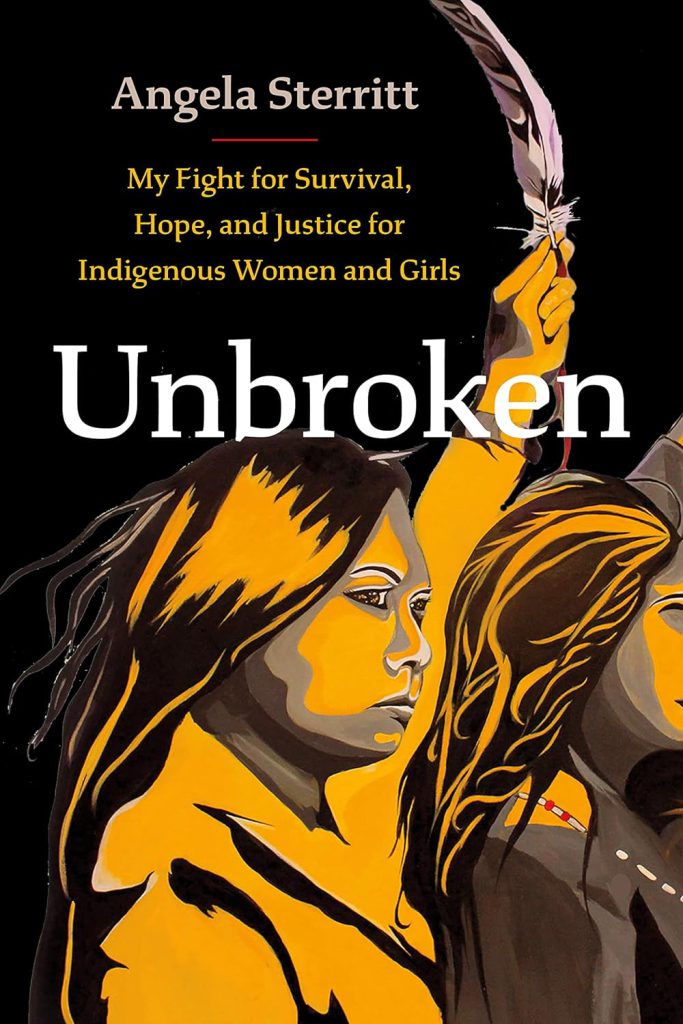Several years ago, I heard my dad scream in the middle of the night. It was such a foreign sound I thought it was leftover from the dream that had woken me up in the first place. I froze on high alert, listening. Nothing. I had nothing in my memory to compare the sound against, so it was easy to quietly dismiss the scream as a dream.
Months later, my dad and I were watching a movie about missing and murdered indigenous women and I found out my aunt had been murdered long before my life was even a possibility. He said the only time he ever screamed was that night when he woke up and saw her face next to his bed. The scream was real, and I did nothing. I didn’t know what to do with that information. I wanted to know more, but nobody ever speaks her name. The pain is still too great. There are probably others I don’t know about who were lost.
So I read Unbroken: My Fight for Survival, Hope, and Justice for Indigenous Women and Girls by Angela Sterritt, a Native journalist who grew up on the streets of Vancouver, Canada. I’ve read a lot on this topic. The book is part memoir and part investigative journalism as Sterritt blends together her own story of survival with the stories of those who were lost along the Highway of Tears in British Columbia. This is a stretch of highway where more than 40 Indigenous went missing or were found murdered. I thought it would be hard to read, but it wasn’t. Each story is filled with an equal amount of love and heartache. As I read, I wondered about my aunt’s story.
Sterritt tells these stories because “She could have been me”. I share the book because this problem is bigger than Canada. My aunt was found in Seattle. In the state of Washington alone, in a single year, over 5,000 Indigenous women and girls went missing. In smaller numbers, similar stories can be found in Alaska and other parts of the nation. As Sterritt shared her experience of walking the same streets as these lost women, I realized that I probably walked on the same street where my aunt lost her life. I’ve been to that area in Seattle several times, often at night. The statistics were mind-boggling. The stories struck me to the core.
As I read deeper, I remembered my mom telling me that I shouldn’t wear my beaded earrings, even though I love making them. They make me feel good. She wouldn’t say why, but she was disturbingly adamant that I shouldn’t wear them. At the time, I interpreted this as disrespecting a heritage that wasn’t her own. I wore them secretly in rebellious Native pride. Now I realize I was missing vital information. My aunt was murdered by a serial killer targeting Native women in Seattle. On the wrong streets, those earrings make me a target. I still make and wear my beaded earrings proudly, but when the shadows come out at night, I hide my heritage in a jewelry box in my purse. 5,000 women in a year. She could have been me.
I used to lay awake at night wondering if I would wake up in the dead of night and see her face. Would I recognize her? Did she spill over from a nightmare my dad was having? Would I share the same dream? I wondered if the desecration of murder was so powerful it could scream through the generations.
All I know is that this book was a journey for Sterritt. It was a journey for me. The stories of these women deserve to be told. Sterritt lived a hard life, but she emerged Unbroken. She seeks justice for the women who were lost along the Highway of Tears. She uncovers unbelievable acts of racism and unfounded hatred for Indigenous people. She shows how law enforcement ignored the problem and more went missing. She refuses to allow the media or the public to turn a blind eye to difficult topics. She lived on the wrong end of justice for long enough to show she speaks the truth.
Most of all, she shows how Indigenous women can survive and thrive in life. This book may be hard for some to read, but knowledge is power. Now I know what my earrings really mean. It’s not fair or just, but I have the power to make myself a little bit safer. It did help in a gas station parking lot late one night. That night, I was white. The world should know that statistically, the world is more dangerous to Native women. Read and learn the root causes of these terrifying numbers, especially if you have a Native population. Help keep that population alive.
STERRITT, ANGELA. Unbroken: My Fight for Survival, Hope, and Justice for Indigenous Women and Girls. GREYSTONE BOOKS, 2024.


